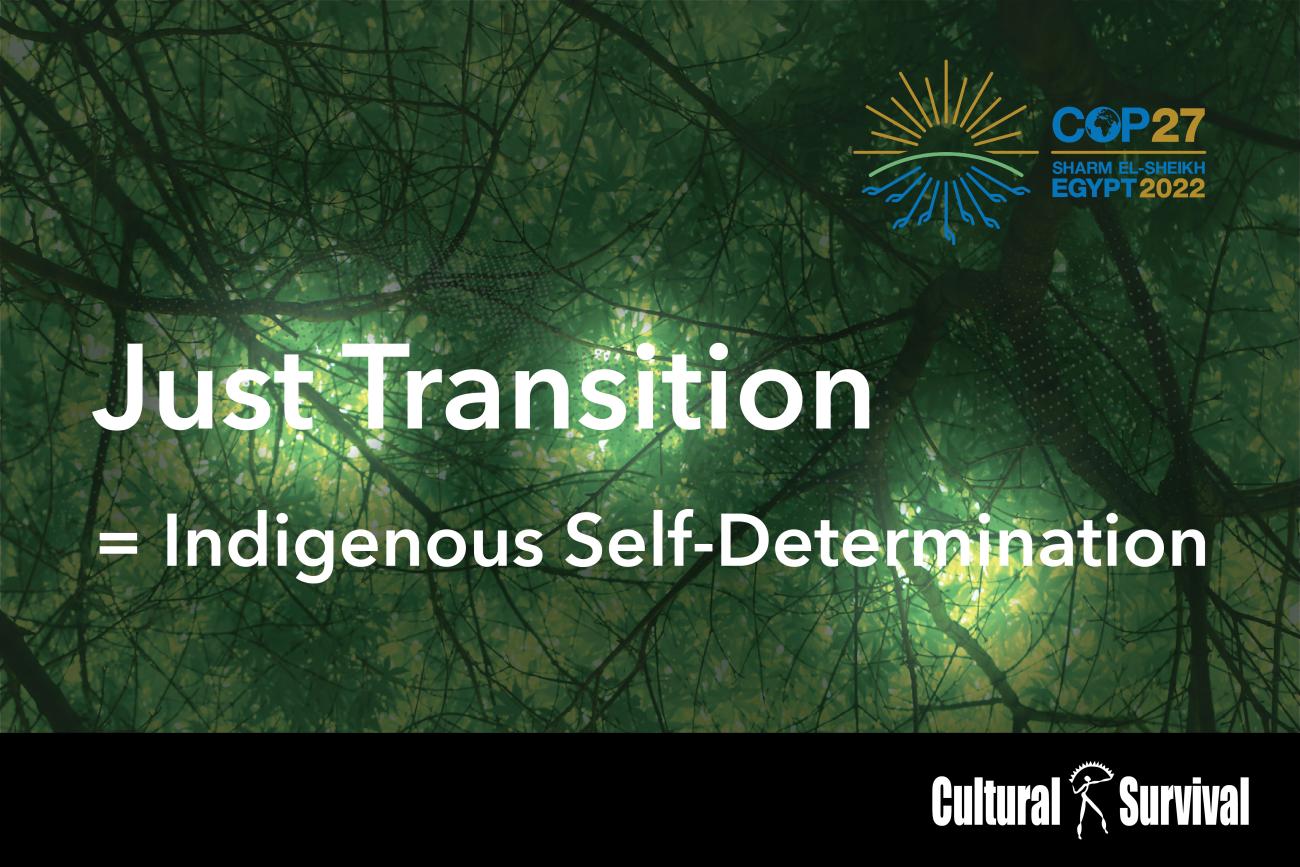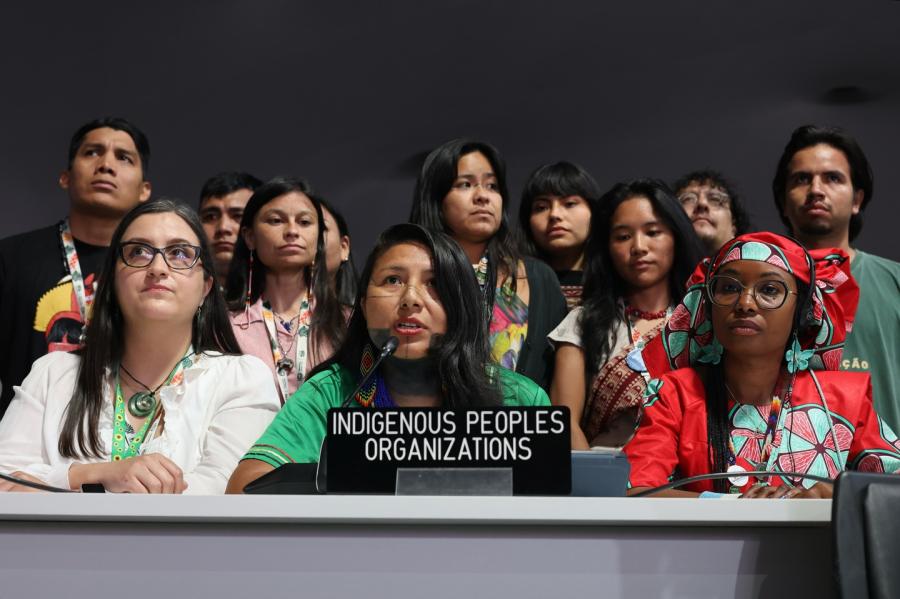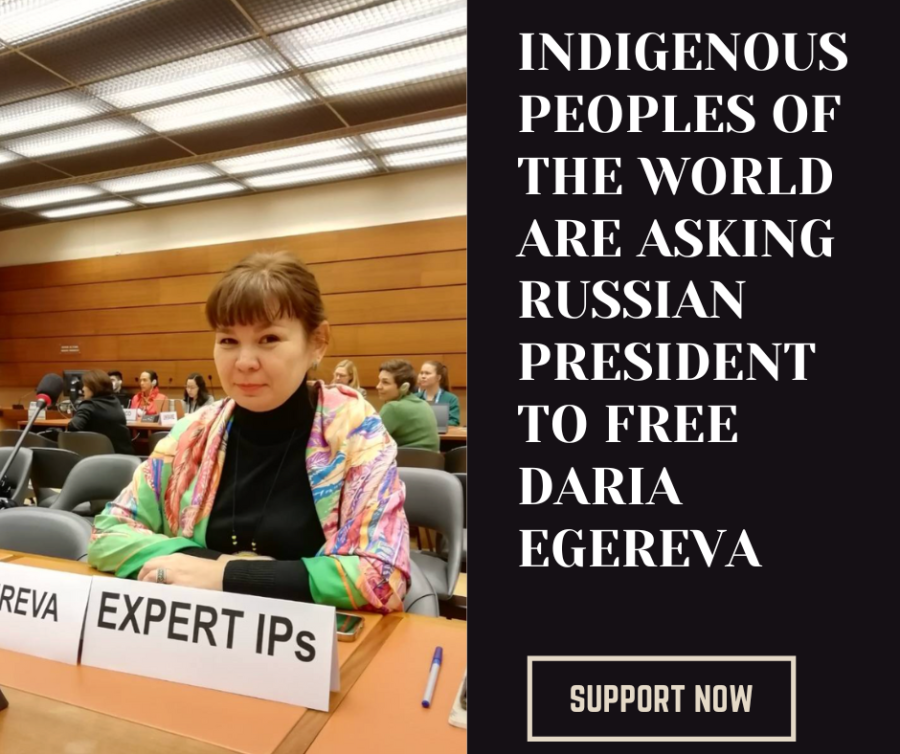
From November 7 to 19, 2022, Sharm el-Sheik, Egypt will host the annual two-week UN Climate Change Conference - the 27th session of the Conference of the Parties to the United Nations Framework Convention on Climate Change (UNFCCC COP27).
As we did last year in Glasgow, Cultural Survival will take an active part in the upcoming conference to fully and effectively engage and advocate for Indigenous Peoples’ rights and support Indigenous leadership and participation. Cultural Survival’s delegation of six will include both staff and non-staff Indigenous activists. We are organizing and will participate in a number of side events in collaboration with partner organizations from the International Indigenous Peoples Forum on Climate Change (IIPFCC) and other Indigenous activists and human rights defenders.
In Glasgow in 2021, global leaders once again failed to act to address the direct impacts and catastrophes of climate change that Indigenous Peoples experience on a daily basis. If the climate crisis is to be abated, and if we are to reach the goal of limiting global warming to 1.5֯°C, the global community must wake up and acknowledge that climate change is an urgent matter that requires true commitment and changes in behaviors.
To ensure Indigenous Peoples’ rights are respected, protected, and fulfilled in the Just Transition to a green economy, we will be advocating for Indigenous self-determination, participation, leadership, and Free, Prior and Informed Consent (FPIC) in the following areas:
Loss and Damage
Today, Indigenous Peoples are more vulnerable than ever to the devastating effects of climate change, which are directly linked to historical and ongoing colonial policies and the seizure and industrial use of Indigenous territories and resources. We highlight that States and governments have the responsibility to Indigenous Peoples to repair the loss and damage, among other obligations. In this regard, it is very important that Indigenous Peoples sit at the same table with governments on an equal footing, offer their solutions to problems, and participate in decision-making processes.
Unfortunately, for now it is only possible to quantify the material damage from natural disasters and calamities that Indigenous Peoples face because of climate change. It is impossible to quantify damage such as the loss of cultures and languages and the holistic impacts on Indigenous Peoples’ identities, ceremonies, and Traditional Knowledge. Therefore, we note the particular importance of taking into account all of the negative impacts of climate change on Indigenous Peoples, including cultural, spiritual, and other effects. In consultation with Indigenous Peoples, States must compensate Indigenous Peoples for such damage and provide direct funding to prevent it in the future.
Direct Access to Funds
A pledge of $19.2 billion was endorsed by world leaders at COP26 in Glasgow for the protection of forests and to end deforestation. Additionally, recognizing the invaluable role that Indigenous Peoples play in climate change mitigation and the solutions they bring to the table, several governments and 17 philanthropic organizations pledged $1.7 billion dollars to fund the efforts of Indigenous Peoples protecting the planet from climate change and biodiversity loss.
However, direct access to adequate and equitable funding has historically been and continues to be a serious problem for Indigenous Peoples. According to a September 2022 report by Rights and Resources Initiative, between 2011 and 2020, just 17 percent of funds allocated specifically to Indigenous Peoples’ or local communities’ forest management and tenure projects named Indigenous Peoples’ organizations as leaders or partners in the project, meaning that the vast majority of funds have been diverted through non-Indigenous-led intermediary organizations or have failed to make it to Indigenous communities at all.
The contributions of Indigenous Peoples and their Traditional Knowledge and practices for adaptation to and mitigation of climate change must be respected, supported, and valued. It must be acknowledged that the challenges Indigenous Peoples face are often different from and more dire than those faced by the dominant populations in the countries or regions where they live. Allocated funding must be equitably available to all Indigenous Peoples and their organizations across all seven socio-cultural regions where Indigenous Peoples are located, in accordance with their self-determined priorities and needs. It is essential that Indigenous Peoples have direct access to finance to support the work on the ground for adaptation and mitigation activities.
Article 6 of the Paris Agreement
Article 6 of the Paris Agreement clarifies how international carbon markets should function to meet emission reduction targets and how parties can pursue voluntary cooperation for achieving their own climate targets.
Cultural Survival’s position on Article 6 remains the same: we do not believe in carbon market mechanisms as a climate change solution. These mechanisms are disguised as Nature-Based Solutions, but in fact, they divert attention from increasing pollution and destruction and allow industrial giants, high-emitting countries, and other major polluters to destroy ecosystems and the environment on the one hand, and to continue taking over Indigenous lands and territories on the other. This is especially sensitive because this article does not require Indigenous Peoples’ Free, Prior and Informed Consent.
In this regard, we want to emphasize that a human rights-based approach must be applied to all articles, decisions, programs, and actions in the area of climate change. We must ensure the application of international human rights standards and the UN Declaration on the Rights of Indigenous Peoples, including compliance with the mandatory application of the FPIC mechanism for all Article 6 provisions.
Human Rights and Securing Indigenous Rights in the Green Economy
Indigenous Peoples are not just stakeholders; Indigenous Peoples are rights holders. Cultural Survival reiterates the importance of Indigenous Peoples’ access to direct participation at the same negotiation tables as nation states at the UNFCCC COP27, with the right to have a voice and vote, and the inclusion of references to human and Indigenous Peoples’ rights in all documents.
We are witnessing the acceleration of the transition to a low carbon and clean energy economy and increasing demand for transition minerals such as nickel, lithium, cobalt, and copper. This skyrocketing demand is driving a wave of investment into new and expanded mining projects. These projects are promoted as “green” because they supply minerals used in renewable energy technologies and electric vehicles. However, these mining projects risk replicating the same harms of the fossil fuel economy: violating Indigenous rights, threatening Indigenous Peoples’ territories–which contain the highest concentrations of these metals globally–and destroying biodiverse ecosystems in the process. Increased mining of these minerals will also lead to conflicts between Indigenous communities and mining companies, and will exacerbate climate change impacts, as well as these operations, are very energy intensive.
Understanding the need for economic development, we believe that the well-being of some communities cannot be built at the expense of the rights of other communities, especially Indigenous communities, whose lands span about 24% of the earth's terrestrial surface and who steward about 80 percent of the planet's remaining biodiversity and make invaluable contributions to climate change mitigation and adaptation, conservation of wildlife, biodiversity protection, and more.
A Just Transition for Indigenous Peoples is one that centers a human rights approach and the protection of biodiversity and advances Indigenous sovereignty and self-determination in all endeavors relating to the building of green economies. Doing this will require that all stakeholders observe and fully implement the UN Declaration on the Rights of Indigenous Peoples and the right to self-determination and Free, Prior and Informed Consent in all decision-making. It will surely also require a set of solutions including reinforcing and improving existing standards, reforming old mining laws and regulations, mandating circular economy practices, setting standards and meeting targets for minerals’ reuse and recycling, reducing demand, and accepting de-growth as a concept and a pathway.



